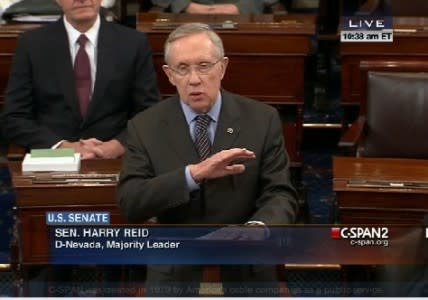The Senate filibuster, R.I.P. (1806-2013)
It was a truly historic moment on the Senate floor on Thursday, when Majority Leader Harry Reid led a Democratic Party push to mostly kill the filibuster, the tool used by minority parties in the past to block votes and motions in the Senate.
The vote will likely ignite a powder keg of partisan rhetoric in an already divided Washington and the fallout could take years to comprehend.
Officially, Reid used a series of parliamentary tactics to change the number of votes needed to move motions onto the Senate floor for most presidential nominations, from 60 votes to 50 votes.
This effectively blocks the Republicans from opposing most Obama administration nominees.
Reid said the rules change applies to federal judge and executive-office nominees, but not to motions about Supreme Court nominees and legislation.
The Washington Post says a key Republican leader, Chuck Grassley, made it clear that the Republicans would consider taking away the Democrats’ ability to block Supreme Court nominees, when the GOP gains control of the Senate back at a future date.
“When that happens, our side will likely nominate and confirm lower-court and Supreme Court nominees with 51 votes, regardless of whether Democrats actually buy into this fanciful notion that they demolish the filibuster on lower-court nominees and still preserve it for Supreme Court nominees,” Grassley said.
Senate Minority Leader Mitch McConnell also said that the move will help the Republicans in next year’s mid-term elections.
“The solution to this problem is an election. The solution to this problem is at the ballot box. We look forward to having a great election on 2014,” he said.
Reid’s move was seemingly expected by both parties, with almost the entire Senate at the chamber on Thursday morning for a vote.
In a long speech before the vote, Reid said he needed to take action.
“It’s time to change the Senate before this institution becomes obsolete,” Reid said. “The American people believe Congress is broken. The American people believe the Senate is broken. And I agree.”
The test vote came on the nomination of Patricia Millet to the influential D.C. Circuit Court of Appeals, which is seen as a stepping stone to the Supreme Court.
Reid used a parliamentary tactic to raise a point of order that only a majority of senators were needed for a cloture vote, or a vote to override a filibuster. Judiciary Chairman Patrick Leahy then acted as the Senate parliamentarian and that the historic precedent required 60 votes in a cloture vote. Reid then succeeded in a 52-48 vote to overrule Leahy’s decision.
The act is the biggest Senate rule change since 1975, when the cloture vote threshold was lowered from two-thirds of the Senate.
The apparent success of Reid’s move also establishes a precedent to kill the filibuster for legislation and Supreme Court nominations, as Grassley alluded to in his Supreme Court comments.
After the vote, President Obama issued a statement supporting the move.
“I support the step a majority of senators today took to change the way that Washington is doing business, more specifically, the way the Senate does business. What a majority of senators determined, by Senate rule, is that they would restore the long-standing tradition of considering judicial and public service nominations on a more routine basis,” he said.
The President’s critics said the filibuster move was also a tactic to divert attention from his struggling health care program.
“If I were taking all the incoming fire that he’s taken over Obamacare, I’d try to change the subject, too,” said House leader John Boehner.
The filibuster’s roots go back to 1805, when the Senate acted on a recommendation from Aaron Burr to eliminate a rule that automatically cut off floor debate.
Scott Bomboy is the editor in chief of the National Constitution Center.
Recent Filibuster Stories
Filibuster Reaction: Harry Reid’s nuclear hypocrisy
Filibuster Reaction: The vote that will change America
Looking at Harry Reid’s statement about filibusters and the Constitution



